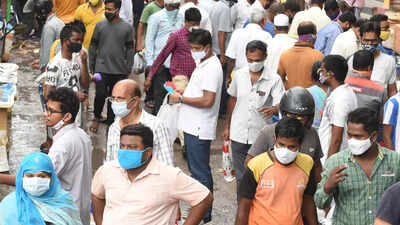Top Searches
- News
- India News
- Covid, inequality, inflation could push 263m across nations into extreme poverty in 2022: Report
Covid, inequality, inflation could push 263m across nations into extreme poverty in 2022: Report

NEW DELHI: A new report by Oxfam International estimates that the combined crises of Covid-19, rising inequality and galloping food prices could push as many as 263 million people across countries into extreme poverty in 2022, reversing decades of progress. This is the equivalent of one million people every 33 hours, the report says.
Another worrisome impact is that the gender pay gap has only further widened — before the pandemic it was forecast to take 100 years to close; now it will take 136 years. “In 2021, there were 13 million fewer women in employment compared with 2019, while men’s employment recovered to 2019 levels,” says the report.
According to the analysis, during the pandemic women were disproportionately pushed out of employment, especially as lockdowns and social distancing affected highly feminized workforces in the service sectors, such as tourism, hospitality and care work. Increased unpaid work has barred millions of women from rejoining labour markets.
Bringing to the fore stark inequalities, Oxfam’s analysis of the latest data from Forbes shows that there are 2,668 billionaires in the world, 573 more than in 2020 when the pandemic began. “At the same time the incomes of 99% of humanity have fallen because of Covid-19, with the equivalent of 125 million full-time jobs lost in 2021,” states the report titled ‘Profiting from Pain’ that will be released on Monday at the World Economic Forum in Davos.
To explain the deep gap, the report highlights that for every new billionaire created during the pandemic — one every 30 hours — nearly a million people could be pushed into extreme poverty in 2022 at nearly the same rate. It says that billionaire wealth has soared during the Covid-19 pandemic as companies in the food, pharma, energy and technology sectors have cashed in.
In a statement, Oxfam International executive director Gabriela Bucher, while elaborating on the impact of the pandemic, said, “Decades of progress on extreme poverty are now in reverse and millions of people are facing impossible rises in the cost of simply staying alive.”
It has been emphasised in the report that there is an urgent need for governments to implement highly progressive taxation measures that in turn must be used to invest in powerful and proven measures to reduce inequalities.
Another worrisome impact is that the gender pay gap has only further widened — before the pandemic it was forecast to take 100 years to close; now it will take 136 years. “In 2021, there were 13 million fewer women in employment compared with 2019, while men’s employment recovered to 2019 levels,” says the report.
According to the analysis, during the pandemic women were disproportionately pushed out of employment, especially as lockdowns and social distancing affected highly feminized workforces in the service sectors, such as tourism, hospitality and care work. Increased unpaid work has barred millions of women from rejoining labour markets.
Bringing to the fore stark inequalities, Oxfam’s analysis of the latest data from Forbes shows that there are 2,668 billionaires in the world, 573 more than in 2020 when the pandemic began. “At the same time the incomes of 99% of humanity have fallen because of Covid-19, with the equivalent of 125 million full-time jobs lost in 2021,” states the report titled ‘Profiting from Pain’ that will be released on Monday at the World Economic Forum in Davos.
To explain the deep gap, the report highlights that for every new billionaire created during the pandemic — one every 30 hours — nearly a million people could be pushed into extreme poverty in 2022 at nearly the same rate. It says that billionaire wealth has soared during the Covid-19 pandemic as companies in the food, pharma, energy and technology sectors have cashed in.
In a statement, Oxfam International executive director Gabriela Bucher, while elaborating on the impact of the pandemic, said, “Decades of progress on extreme poverty are now in reverse and millions of people are facing impossible rises in the cost of simply staying alive.”
It has been emphasised in the report that there is an urgent need for governments to implement highly progressive taxation measures that in turn must be used to invest in powerful and proven measures to reduce inequalities.
FOLLOW US ON SOCIAL MEDIA
FacebookTwitterInstagramKOO APPYOUTUBE
Looking for Something?

Start a Conversation
end of article

